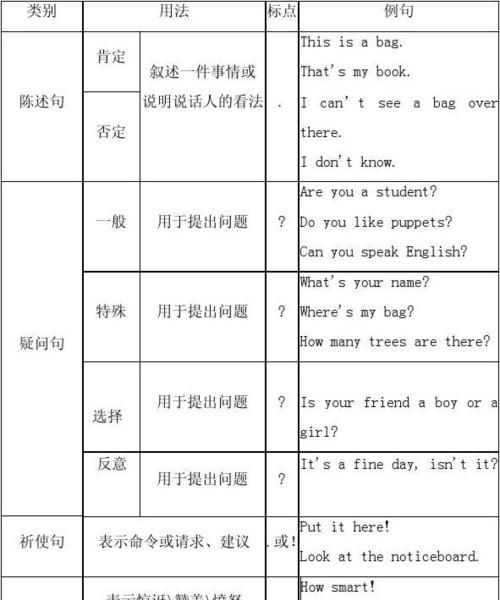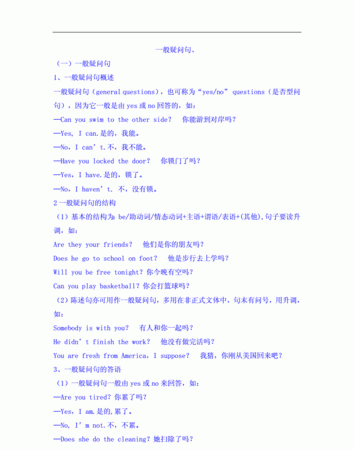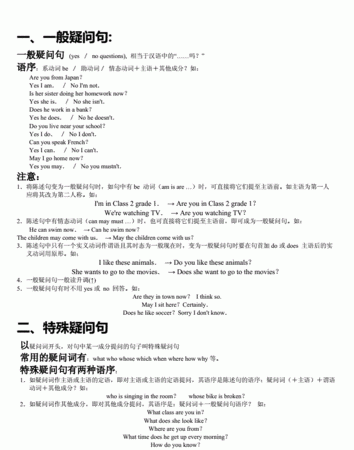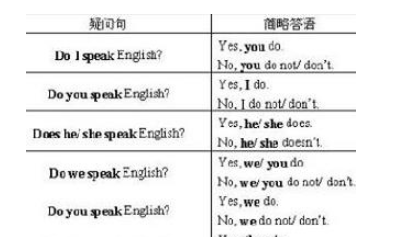本文目录
一般疑问句例句
一、什么是一般疑问句
疑问句总共分为4种类型,一般疑问句就是其中之一。在通常情况下,一般疑问句只能用yes或no来回答。一般疑问句也是初中英语教材中核心的语法知识点。
二、一般疑问句的结构
1、一般疑问句通常以be动词、助动词或情态动词为首,后跟主语,再接句子的相关成分,例:
Are you from Beijing?
你是来自北京的吗?(are为be动词,you为主语)
Do you work in a bank?
你在一家银行工作吗?(do为助动词,you为主语)
May I borrow your book?
我能借你的书用一下吗?(may为情态动词,I为主语)
2、一般疑问句的回答,通常为以下结构:
肯定:Yes,主语+提问的be/助动词/情态动词.
否定:No,主语+提问的be/助动词/情态动词的否定形式.
例句:
Are you from Japan﹖
Yes, I am. / No, I'm not.
Do you work in a bank?
Yes, I do. / No, I don't.
May I borrow your book?
Yes, you may. / No, you mustn't.
三、肯定句改一般疑问句的规则
1. 肯定句中有some,就把some变成any。
例句:
There are some apples on the table.
Are there any apples on the table?
2.肯定句中有be动词(are/is)就把be动词提到句首。
例句:
You are a teacher.
Are you a teacher?
3.肯定句中有be动词的过去式(was/were),将其提到句首。
例句:
You were a doctor.
Were you a doctor?
4. 肯定句中有情态动词(can/could/will/would/shall/may/must),将其提到句首。
例句:
I may go home now.
May I go home now?
5. 肯定句中有had better,就把Had提到句首。
例句:
I'd better go now.
Had I better go now?
6. 肯定句中有肯定句中有实义动词原型,就在句首加Do。
例句:
I work in a bank.
Do you work in a bank?
7. 肯定句中有实义动词三单现,就在句首加Does, 实义动词三单现变回实义动词原型。
例句:
He works in a bank
Does he works in a bank.
8. 肯定句中有实义动词过去式,就在句首加Did, 实义动词过去式变回实义动词原型。
例句:
He told you.
Did he tell you?
9. 肯定句是I am… ,就把I am…变成Are you….。
例句:
I am a Chinese.
Are you a Chinese.
10. 变一般疑问句时,肯定句I was… ,就把I was…变成Were you…。
例句:
I was a teacher.
Were you a teacher.

英语一般疑问句10个例句
选择疑问句(alternative questions)一般提出两种或两种以上的可能,问对方选择哪一种.其结构可用一般疑问句,也可用特殊疑问句,供选择的两部分由or连接,前者用升调,后者用降调,如:
1.Would you like coffee or milk?
Either is ok.
2.—Would you like coffee or tea?
—Tea,
3.—Shall we watch TV or go to the concert?
—I’d prefer to go to the concert.
4.—Shall I come to pick you up or shall we meet at the airport?
—As you please.
5.Will you go there by bus or by train?
你准备乘汽车,还是乘火车去那儿?
6.How many pens do you have ,one or two?
你有几枝钢笔,一枝还是两枝?
7.s it right or wrong?是对还是错?
8.Were you or he there?是你还是他在那儿?
9.Are they reading,chatting or watching television?他们是在看书、聊天,还是在看电视?
10.Do you want to go there by land or by air?你将乘车还是乘飞机去那儿?
11.Which do you like better,coffee or milk?
你更喜欢喝什么,咖啡还是牛奶?
12.What colour is it,red,blue or yellow?
它是什么颜色,红的,蓝的,还是黄的?
13.Where are you going,to the classroom or to the library?你要去哪儿,教室还是图书馆?
14.How shall we go,by sea or by land?
我们怎么去,走水路还是陆路?
15.Do you want to buy it or not?
你是想买它还是不想买?
16.Are you ready or not?
你准备好了还是没有准备好?
17.—Do you go to work by

写疑问句的句子有哪些
1. 一般疑问句:
助动词+主语+谓语(助动词包括be,have表示有时,还有情态动词)+其它?
Do you like my pen?
Have you any money? =Do you have any money?
2.特殊疑问句(疑问词不做主语时)
疑问词+一般疑问句?
What is he doing?
Where has your teacher lived?
3.特殊疑问句(疑问词做主语时)
疑问词+谓语+其它?
Who will come?
What has happened to him?
1:句子1: what are the things you like doing ? 这个句子有BE动词,为什么有?
【本句问的是“你喜欢做的事情是什么?”,其实就是问:事情是什么,主语是事情,所以应该有be。要是没有be就不成为句子了。】
句子2: what food do you eat for dinner? 这个句子里的food 前面没有BE动词?为什么?
【本句问的是:你(晚餐)吃什么食物?这里有“吃”这个动作做谓语了,所以,没有be动词,而是用do作助动词】
句子3: what personal appointments do you have this month? 也没有BE动词。
【这个其实与第二个句子一样的。问的是:这个月你有什么私人约会?既然有“have",那就不用be了。】
问题2:it is fine with me【这对我挺合适】
it is fine for me【这我也没问题】
I like the weather, don't mind a bit cooler, but the way it is is fine with me.我喜欢现在的天气,不介意再凉一点,可是就是这样我也很开心。
He has said it is “fine with me” if American troops remain in Iraq for “maybe a hundredyears”.他曾经说过如果美军在伊逗留“100多年”他也“可以接受”。
I don't really think so, it is fine for me. (Do you want me to turn it down ? )对,是有一点嘈杂,但我还是蛮喜欢的.(你想让我调轻一点吗?)
Maybe that is fine for me, It needs me sinkinto my endless dark.
也许这对我是好事,它一定是要我沉入无尽的黑暗之中。

现在完成时的一般疑问句和特殊疑问句
现在完成时一般疑问句:Have they been to UK twice? 他们去过英国两次吗?特殊疑问句:Where have they been to twice? 他们去过哪里两次?
“一般疑问句”是由“be动词(也可以是助动词,或情态动词)+主语+其他成分”构成的句型。
一般疑问句是疑问句的一种,当回答“一般疑问句”时,可以用yes或者no回答,例如:Do your parents like English? 你的父母喜欢英语吗?
肯定回答:Yes,they do. 是的,他们喜欢;否定回答:No,they don’t. 不,他们不喜欢。

注意
在一般疑问句中,要表达“一些”时 ,一般用any,但如果这个问句是用来表达 “建议、请求、邀请”等交际功能时 ,应该用some。
例句:Is there any tea in the cup?
翻译:杯子有茶吗?
以上就是关于一般疑问句00个例句 ,一般疑问句例句的全部内容,以及一般疑问句100个例句 的相关内容,希望能够帮到您。

